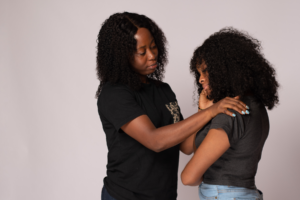Navigating mother-daughter relationship issues can be challenging and emotionally taxing. Many women, including myself, carry the emotional scars of a “mother wound,” an often overlooked aspect of personal development that can significantly affect one’s mental and emotional well-being. In this blog post, we explore what the mother wound is, how it manifests in mother-daughter relationships, and ways to heal and strengthen these bonds.
The term “mother wound” refers to the generational trauma passed down from mother to daughter. It encompasses emotional and psychological wounds that mothers, often unknowingly, inflict on their daughters. This trauma can stem from a variety of sources, including a mother’s own unresolved issues, societal expectations, or cultural norms.
Common Mother Wound Manifestations
Lack of Emotional Support: Many daughters feel that their mothers were emotionally unavailable, which can lead to feelings of abandonment and a lack of self-worth.
Criticism and Judgment: Some mothers may be overly critical, leaving their daughters feeling inadequate or constantly seeking approval.
Unresolved Trauma: A mother’s unresolved trauma can spill over into her parenting, leading to dysfunctional relationship dynamics.
Mother Wound Statistics
– According to a study published in the Journal of Family Psychology, 60% of daughters report having unresolved issues with their mothers that affect their emotional well-being.
– The American Psychological Association notes that unresolved mother-daughter relationship issues can contribute to depression, anxiety, and other mental health problems in adult daughters.

Mother-daughter relationship issues can be deeply ingrained, but they are not insurmountable. Understanding and addressing these issues is the first step toward healing.
Acknowledge the Issues
The first step in addressing the mother wound is acknowledging its existence. Many women feel a sense of guilt or shame when they think negatively about their mothers. It is important to recognize that acknowledging these feelings does not mean you do not love your mother; it means you are aware of the need for healing.
Open Communication
Opening lines of communication with your mother can be a crucial step toward healing. It can be helpful to approach the conversation with empathy and a willingness to listen, as well as to express your own feelings honestly.
Be Honest and Respectful: Share your feelings without blaming or accusing.
Set Boundaries: Define what topics are off-limits or how you would like to be treated in future interactions.
Seek Understanding: Ask your mother about her experiences and feelings to gain a deeper understanding of her actions.
Seek Professional Help
Therapy can be an invaluable tool in addressing mother-daughter relationship issues. A therapist can provide a safe space to explore these complex emotions and help you develop strategies for healing.
Types of Therapy
Individual Therapy: Focuses on understanding and healing your own emotional wounds.
Family Therapy: Involves both mother and daughter, helping them to communicate and resolve their issues together.
Practice Self-Care and Self-Compassion
Healing from the mother wound involves nurturing yourself and practicing self-compassion. Recognize that your feelings are valid and that you deserve to heal.
Journaling: Write about your feelings and experiences to gain clarity and emotional release.
Mindfulness: Practice mindfulness or meditation to stay grounded and manage stress.
Healthy Boundaries: Set boundaries that protect your emotional well-being.
Build a Support Network
Surround yourself with a supportive network of friends, family, or support groups. Having people who understand and validate your experiences can provide comfort and encouragement on your healing journey.
Mother Wound Support Resources:
Support Groups: Look for groups focused on mother-daughter relationship issues or general trauma support. MeetUp is filled with great groups.
Online Communities: Join online forums or social media groups where you can share your experiences and find support.
Suggested Reading: What Happened to You by Oprah Winfrey & Bruce Perry // It Didn’t Start With You by Mark Wolynn
Healing the mother wound is a journey that takes time and patience. It involves breaking the cycle of trauma and creating a new legacy of healthy, supportive relationships.
1. Forgive Yourself and Your Mother: Understand that both you and your mother were doing the best you could with the tools you had.
2. Release Resentment: Letting go of anger and resentment can free you from the emotional burden of the mother wound.
3. Create New Patterns: Develop new ways of interacting that are based on mutual respect and understanding.
Addressing mother-daughter relationship issues and healing the mother wound can lead to profound personal growth and healthier, more fulfilling relationships. It is a journey that requires courage, compassion, and commitment, but the rewards are well worth the effort. By acknowledging the mother wound and taking steps to heal, you can break the cycle of trauma and create a legacy of love and support for future generations.
Remember, you are not alone in this journey. There are many resources and communities available to support you as you navigate these complex emotions and work toward healing. Embrace the process, and know that healing is possible.
On episode 161 of Girl Stop Playin, I spoke with Therapist & Educator Dr. Shante Holley who shared her personal and professional experiences with the mother wound and black women.
Powered by RedCircle
On episode 167, Jennifer Arnise shared a beautifully tragic breakdown of how the mother wound traumatizes black families.
Comments are closed.